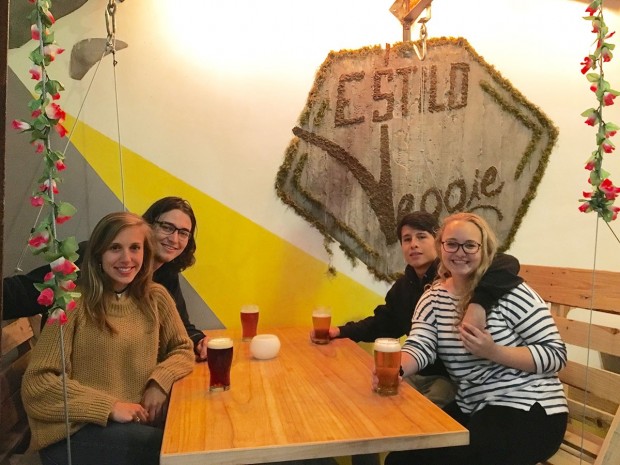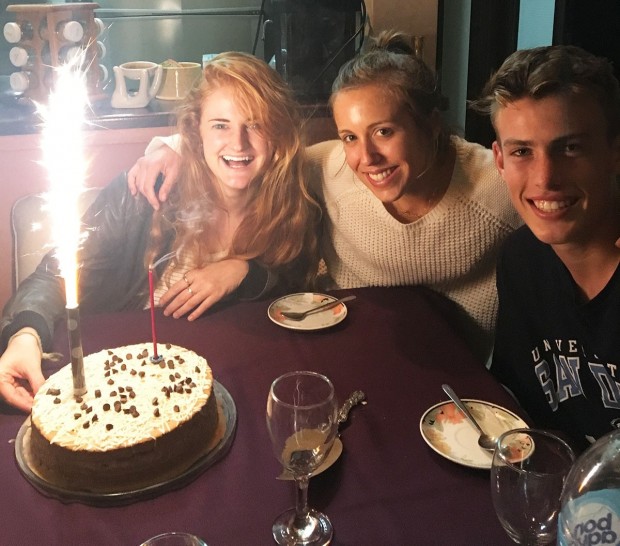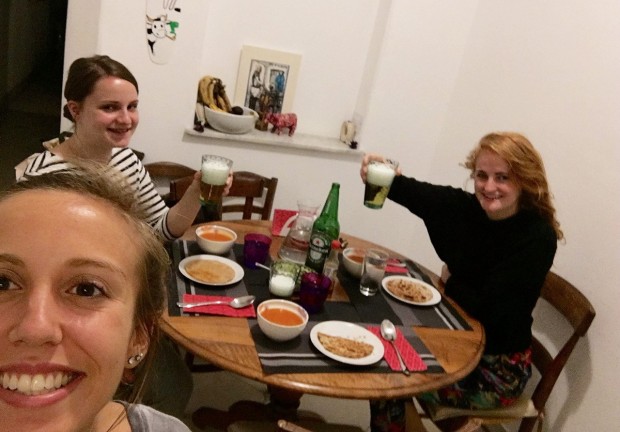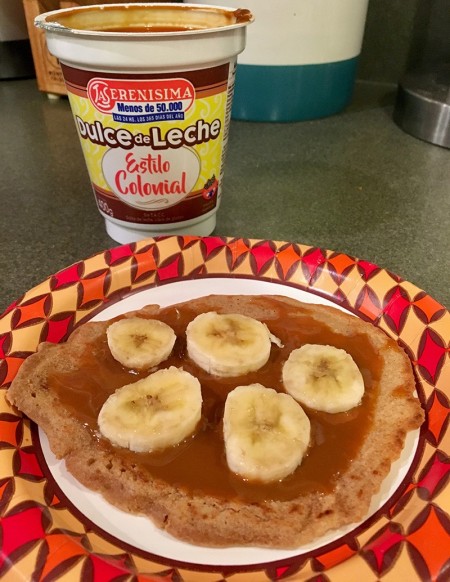Cooking with Karina: A Broad Abroad


Karina Arnold with friends Jack Wickum from Colorado, Olivia Davis from Delaware and Jorge Pulido from Venezuela, dining at one of Buenos Aires' many vegan restaurants.
Karina Arnold is a junior at the University of Oklahoma who’s passionate about healthy cooking. She provides creative, healthy recipes and tips on clean eating.
My mom studied abroad five times. My dad was born abroad and traveled often after joining the U.S Navy in his teens. Naturally, I also was bit by the travel bug. Since high school, I have traveled to a new country every year with family, backpackers or volunteer groups. I am in a constant cycle of researching visas, booking flights and packing gear. I thought I knew how to travel, how to adapt, how to navigate; however, studying abroad in Argentina for five months exposed my travel weaknesses and my strengths.

Karina Arnold's host mom baked a torta with dulce de leche for her roommate's birthday and they enjoyed it during "sobremesa" or post-dinner table talk. (Pictured, from left) Becca Lancaster, Karina Arnold and Milo Libby.
The most popular follow-up question after “how was Argentina?” is “how was the food?” Although Buenos Aires is hailed as the “meat capital of the world,” I did not have trouble remaining vegetarian. In the capital Buenos Aires, there were a lot of fusion restaurants and the cuisine is hard to classify. Argentina is the country with the second-largest number of immigrants, with 6.6 million, second only to the United States with 27 million. One of my favorite restaurants was a ramen house started by a native Houstonian and her Argentine husband.
Although there was a lot of diversity in the cuisine I learned (to my despair) that Argentines do not like spice. I received side-eye and horrified expressions when I whipped out my hot sauce. Unlike most American restaurants, there is no salt on the table and finding hot sauce was like finding the Holy Grail. Although the food lacked the Tex-Mex classic kick, I learned to appreciate simplicity. The subtle taste and little seasoning allows one to taste and appreciate the individual flavor of each ingredient.

Karina Arnold with friends Charlotte Phillipe and Becca Lancaster. They made crepes and pumpkin soup using produce from the local farmer's market in Argentina.
In addition to meat, Argentine cuisine included dairy, bread and dulce de leche. Dulce de leche, or the nectar of the gods, was a dietary stable in every Argentine’s pantry. Argentines dip, slather and spread dulce de leche on toast, cakes (or tortas), brownies, alfajores, and ice cream. This caramel, creamy, sweet sauce made its way into my daily diet. My host mom gave me a jar to take home, and taught me how to make these Crepes with Dulce de Leche, a treat I made for my family so they could have a taste of the argentine experience.
Before leaving for Argentina, I expected the cuisine to be different; however, I did not expect to dine differently. Unlike America, Argentines do not value breakfast and often skip it. Dinner, which is usually around 9 or 10:00 p.m. was the largest meal of the day and lasted about two or three hours. Argentines love “sobremesa” or conversing around the table. After eating, in restaurants or at home, plates are not cleared away nor is a check placed on the table, rather, an additional hour is spent conversing with friends and family. It is rude to leave after finishing or ask for the check too quickly because it shows you did not like the company or you did not enjoy the food and need to excuse yourself. Thankfully, my host mom informed me of this so I did not offend any Argentines.
Like cooking, studying abroad provided amazing flavors and experiences and other times, it was hard and left a bad taste in my mouth. While studying abroad, I learned outside and inside the classroom. Abroad, I improved my Spanish, I ate delicious treats and I fiesta’ed like there is no mañana; however, the most important thing I learned abroad was about myself and where I fit in the world. I did not come home “enlightened” or completely changed, but I did peak into a new culture and gained insight of Argentina, people and myself.
Traveling exposes the paradoxes of humanity: how big, yet simultaneously little the world is and how different, yet similar humans are. I got bit by the travel bug and I’m itching to keep going.
Want more buzz like this? Sign up for our Morning Buzz emails.
To leave a comment, please log in or create an account with The Buzz Magazines, Disqus, Facebook, or Twitter. Or you may post as a guest.



